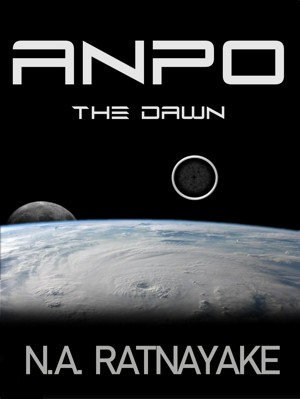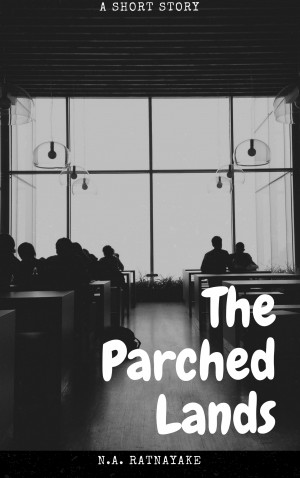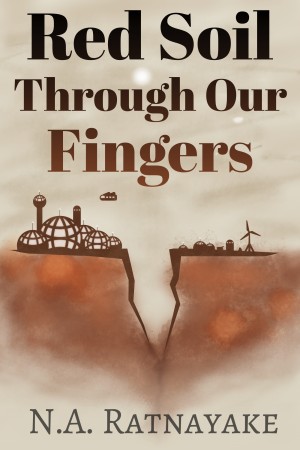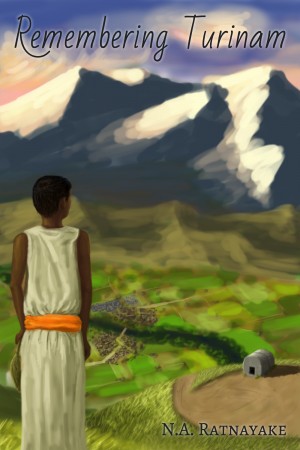Interview with N.A. Ratnayake
Published 2015-10-31.
Where did you grow up, and how did this influence your writing?
I've lived in many places, but I did almost all of my growing up in Boise, Idaho. That's where I went to school and graduated from high school. To this day I consider Boise my "hometown."
I think growing up in Boise specifically affected my writing in two major ways: the power of community, and how to be comfortable being different from the community. The northwest is a friendly place -- neighbors know each other. Kids grow up together, live on the same street, go to the same school, play in the same sports leagues, etc. You're bound to meet someone you know in the grocery store, and even if you don't know them they'll still say hi to you in line and ask how you are. And when a neighbor is in trouble, the whole neighborhood rallies and provides support in any way they can. I like that sense of community, and I think some of that sentiment has made its way into Red Soil and my other writings.
I did have to learn how to be comfortable in my own skin though. I'm sure Boise is at least relatively more diverse these days, but in the late eighties and early nineties, it was a pretty white, Christian (mostly Mormon), conservative place to be. I was the ONLY student in my first elementary school that did not meet 100% of these criteria. I never encountered outright or malicious racism, but plenty of simple ignorance or unassuming exclusion-by-default. My hometown gave me a head start in thinking about a balance between assimilating to the dominant culture of a community versus outright self-ostracizing in the name of individual identity.
More broadly, I think the American West in general has had a powerful influence on my writing. I also lived in Washington, Arizona, and California before moving to New England in 2012. As a region, the West is the backdrop for a rich interplay of conquest, struggle, colonialism, industry, idealism, identity, and hope. These motifs no doubt emerge in my fiction.
Do you remember the first story you ever read, and the impact it had on you?
I don't remember what the first story I ever read was. However, my mother assures me that "Big Wheels" by Anne Rockwell was an oft-requested favorite. I'm sure it played a subtle effect in my eventual fascination with machines, systems, and, as my first career, engineering.
What do you read for pleasure?
Science fiction and fantasy have been staples of my bookshelves and library record since childhood, but literature, contemporary novels, and a good deal of nonfiction weighs in pretty heavily as well. Most of the last category ends up being science, education, history, social justice, philosophy, and policy. I've recently been discovering short stories as a source of reading pleasure -- not just genre, but lit mags, the classics, and contemporary anthologies as well.
Who are your favorite authors?
So many, and for so many different reasons. When I was young, Alexandre Dumas filled me with a sense of adventure and romance that has certainly left its marks on my personality. As a teen, I read Timothy Zahn's "Heir to the Empire" trilogy and realized explicitly for the first time that the dichotomy between genre writing and good writing was a false one. It's cliche, but yes I went through a Hemingway phase in college; and though now I can also acknowledge that he was also a hypocritical asshole, his style and perspective on writing have definitely influenced my own approach. I admire Jhumpa Lahiri for taking on transnational issues of immigration and identity for the South Asian diaspora. And most recently, I have to applaud writers like N.K Jemisen and Daniel José Older for challenging the status quo of speculative fiction and pushing the genre in new directions.
What is your e-reading device of choice?
I'm a fan of my B&N Nook Simple Touch. With an SD card, it stores effectively infinite books for my purposes, uses epaper instead of a screen, and can read open formats like epub as well as the Nook proprietary format.
I don't want to read on a screen, so any of the "reading tablets" are out. I also don't like Amazon's evil empire approach of trying to lock down the ebook market into 100% proprietary mobi land, so the Kindle isn't for me either. The readers not associated with a bookseller (e.g. Sony, etc) often can't access new releases, and are therefore suboptimal as well.
How do you discover the ebooks you read?
Same answer as where I discover the dead tree edition books I read -- everywhere.
Sometimes my Nook recommends things for me -- more often its a friend that does the recommending. If I come across a physical book I think looks interesting, I'll usually scan the barcode into my Goodreads and see if there are ebook editions available from either B&N or Kobo. Blogs which often post deals on interesting science fiction ebooks (e.g. SFSignal) are good bets.
An unexpected source: My friend Zach finally succeeded last year in convincing me to register to vote for the Hugo science fiction and fantasy awards. For the $40 supporting membership fee to the annual World Science Fiction and Fantasy Convention (Worldcon), not only do you get nomination and voting rights to to the Hugo, but THEY SEND YOU A BUNDLE OF THE FINAL NOMINEES IN EBOOK FORM! Think about it. That's a good chunk of what fans in the genre consider the best work of the year -- five each in novel, novella, novelette, short story, graphic novel, etc. -- for just $40. I mean, seriously, wat.
What is your writing process?
Red Soil is my first novel-length story, so the scale of it is something new for me. The process has really made me reflect on my approach to writing.
I usually start by free-writing about an interesting premise or idea that has been bouncing around in my head for awhile. If the free-write leads to some characters in an intriguing conflict, then I'll see where it goes. At some point I'll be able to see enough of the vision for the story that I can stop and lay out the basic skeletal structure of it.
The next step is usually to write a Draft Zero (first complete draft with story structure) from beginning to end, modifying the story skeleton as I go if better ideas come up along the way. Draft Zero is a draft in the loosest sense. It has a complete story, but the character arcs probably don't make any sense, the ending details of things and people don't match what I started with, the events don't necessarily happen in a logical order, and large swaths of it read like stream-of-consciousness. Think of Draft Zero as a novel-length memo to myself about what want to write about. At this stage I find it easiest to draft in a minimalist editor, such as FocusWriter.
Draft Alpha is basically a complete re-write of Draft Zero, but this time telling the story as it should be told. I do character sheets, import the story into Scrivener and make scene cards, do the research to flesh out the details of the setting and technology, etc. I'm paying much more attention to structure, character arcs, pacing, etc. Draft Alpha is clunky, but at least it mostly resembles an actual novel.
I send Draft Alpha out to alpha readers, which mostly means the writer group I meet with physically here in Boston. People I trust to see the story in a very raw form, see what I'm going for despite glaring problems, and make recommendations for major revisions. For me, just because of my initial idea-centered and plot-driven approach, this usually means a of character work, which is the aspect of writing that I find most challenging.
Draft Beta goes out to a wider circle of beta readers, and is a sort of "taste test" for what remaining revisions and polishing needs to be done. I try to include not only my close writing circle, but subject matter experts in the technology or settings involved, avid readers of science fiction, readers who do NOT normally read science fiction, and people who are not necessarily passionate about the issues involved in the story.
After final revisions, a copy-edit, and some polishing, then I submit the final manuscript.
How do you approach cover design?
I've never done my own cover, because I'd describe my freehand and digital art skills as "stick spaceships". I've recently started collaborating with a graphic artist and childhood friend with whom I recently reconnected, Stephanie Hoover. She did the cover for "Remembering Turinam" as a quick hobby thing, and may do one for "The Parched Lands" as well. I'm excited to have her on a paid contract for something more in depth for my upcoming novel, "Red Soil Through Our Fingers", which I hope to release later this year.
What motivated you to become an indie author?
I write because I'm fascinated by the intersection of people and ideas. And almost all of the time, my writing has a message I want to send about the world, about society, about the human condition, or about who we are as people and what we could become if we tried. Writing to me is a means to an end. Its a way to have a discussion with the literary community, the science fiction community, and the public at large about issues that affect us all.
Sure, it would be nice to recoup the cost of cover art, editing, and marketing; but at the end of the day, I've got a full-time teaching career that I love, and I'm certainly not out to land some giant fancy book deal.
Being an indie author means that I have a lot of freedom and flexibility to focus on sharing my stories and getting word out about the ideas. Being indie means I don't have to work with a publisher's imperative to make a profit, which I think often gets in the way of more important reasons to be writing.
Describe your desk
Hold up. You're saying there's a desk somewhere under that pile of papers and sundry household items?
Smashwords Interviews are created by the profiled author or publisher.
Books by This Author
Anpo (The Dawn)
by N.A. Ratnayake
Saveen has been selected out of many candidates to become the Storyteller, a person who will represent humanity to an unnamed entity via the Swirl, an orbital interface in spacetime. But when the Swirl is activated, all does not go according to plan… and Saveen learns that the role we play in history may not be the one we intended.
The Parched Lands
by N.A. Ratnayake
Amanthi is a teenage student in a not-so-distant future school system of hyper-testing and top-down control. In this world, creativity is a liability — but Amanthi is not deterred from dreaming.
Red Soil Through Our Fingers
by N.A. Ratnayake
A Mars colonist accepts a deal with a mining company to start a new life on humanity's off-world frontier; but idealism turns to unease when reality becomes darker than the fine print foretold. With his farm under biological attack and the most powerful player on the planet as an enemy, Mahela has no choice but to flee with information vital to the future of millions.
Remembering Turinam
by N.A. Ratnayake
Salai returns to his childhood home with turbulent questions — he leaves with a mission. Originally published in "We See A Different Frontier", this short story received an honorable mention in Gardner Dozois’s "The Year’s Best Science Fiction, Thirty First Edition".




